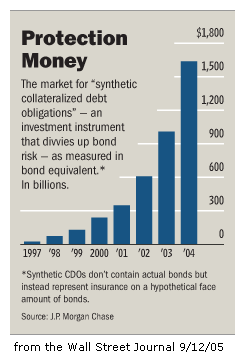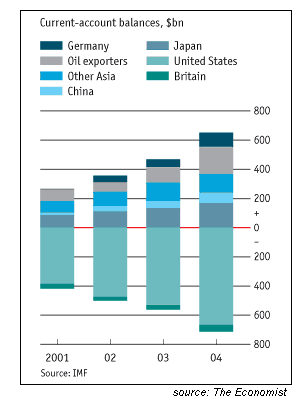

|
| weblog/wEssays archives | home | |
|
Why I am Not a Pundit, or, I Could Be Wrong (September 11, 2006) The media will be filled with commentaries on this memory-seared day, and as a result it's a good time to remember something else: nobody knows what the future will bring. Pundits of all stripes, red, blue, green, well-paid, free, snide or serious, lay claim to some insight into events which, by extension, is a prediction of future events. Not many (let's just be brash and say none) mention the uncomfortable reality that no one can accurately predict the future. If someone is so confident of their crystal ball, then I invite them to pony up $100,000 and buy some options to back up their prediction. If they're right, their $100K will turn into a million bucks. Yes, it's pretty easy to leverage a 10-bagger in options if you buy out of the money calls or puts. (Ditto for futures.) You just have to be right. What? Not as confident as we readers imagined? Suddenly there's caveats? If you aren't sure enough to put down your own money in serious amounts, then perhaps one shouldn't put on such confident airs. I have no idea what will happen to the value of oil or the dollar, where interest rates, or any other metric of finance or economics, will be. I do know, however, that the risks of various imbalances are at historic or unprecedented highs. Maybe nothing will happen in the next year or two, and everything will remain pretty much as it is today. That's certainly what's happened for the past two years. But just to mention some potential risks which have been covered here before:  1. The U.S. government is running a large deficit, and must sell hundreds of billions in
bonds each and every year. There is no Plan B. (Cut the deficit? Are you nuts?) The
bonds must be sold to re-finance $6 trillion in old debt and
all new debt ($300-$400 billion a year, depending on which numbers you believe).
Foreign governments and institutions have supported this debt binge by buying
significant amounts of this debt. If for whatever reason they decide buying U.S. debt no
longer serves their best interests, then U.S. bond rates will have to rise high enough to
bring other buyers out of the woodwork.
1. The U.S. government is running a large deficit, and must sell hundreds of billions in
bonds each and every year. There is no Plan B. (Cut the deficit? Are you nuts?) The
bonds must be sold to re-finance $6 trillion in old debt and
all new debt ($300-$400 billion a year, depending on which numbers you believe).
Foreign governments and institutions have supported this debt binge by buying
significant amounts of this debt. If for whatever reason they decide buying U.S. debt no
longer serves their best interests, then U.S. bond rates will have to rise high enough to
bring other buyers out of the woodwork.
It's worth remembering: interest rates aren't set by the Fed, they're set by the buyers and sellers in the bond market. The Fed could lower interest rates to 1% again, inflation could fall to zero, and interest rates could still rise to 13%. If that's what it takes to scare up some buyers, then that's what the rate will be. Is that likely? Perhaps not. But is it impossible? No--because we are beholden to foreign buyers, whose interests may diverge from those of our government.  2. As measured by the VIX and other metrics, risk has apparently been banished from
global markets. Thanks to the rise of derivatives, in their uncounted trillions of
dollars of exposure, every possible scenario has been hedged with an option or future.
Risk has been sliced and diced and hedged to the point that it simply doesn't exist any more.
Market drops? No problem, our puts will cover the loss. And so on, in every market and
every commodity.
2. As measured by the VIX and other metrics, risk has apparently been banished from
global markets. Thanks to the rise of derivatives, in their uncounted trillions of
dollars of exposure, every possible scenario has been hedged with an option or future.
Risk has been sliced and diced and hedged to the point that it simply doesn't exist any more.
Market drops? No problem, our puts will cover the loss. And so on, in every market and
every commodity.
Nice, but mathematical models suggest risk can never be squeezed down to near zero. What if, just to play Devil's Advocate, risk hasn't been banished but merely cloaked? Put another way--what if some macro-event occurs which has not been sufficiently hedged? What if hedged positions start unraveling faster than risk models predict? No one knows the answer, because the global financial markets have never been so leveraged, so hedged, or so liquid. For more, please read The Misbehavior of Markets  3. The demand for and supply of oil are precariously balanced at 84 million barrels a day.
This is unprecedented. Prior to the growth of China, there was always a significant
margin of supply above and beyond any demand. While supply could be artificially lowered
by voluntary caps or political embargoes, the actual supply always exceeded demand. No longer.
Simply put, a precarious balance is more vulnerable than one of untapped surplus.
3. The demand for and supply of oil are precariously balanced at 84 million barrels a day.
This is unprecedented. Prior to the growth of China, there was always a significant
margin of supply above and beyond any demand. While supply could be artificially lowered
by voluntary caps or political embargoes, the actual supply always exceeded demand. No longer.
Simply put, a precarious balance is more vulnerable than one of untapped surplus.
The Saudis always claim they can pump another couple million barrels a day, but they rarely mention that it's heavy sulfur-laden oil which few refineries can refine. So the bottleneck remains. All the pie-in-the-sky fantasies of shale oil and the like--well, they're years away from production in quantities that matter--and may have physical limits on daily production which cannot be overcome. (The U.S. uses 23 million barrels a day, and the entire Canadian shale oil fields will produce 3 milion barrels at full production. And China has spoken for at least 1 million barrels per day, so it's actually 2 M at best.)  4. The trade imbalance (as noted last week) exceeds 6% of U.S. GDP, a rate which
historically has not been sustainable. Does that mean we can't keep up the buying binge
of overseas goods? I have no idea, but it's certainly not a guaranteed bet that there will
never be any unhappy consequence of current account deficits on the order of $1 trillion/year.
4. The trade imbalance (as noted last week) exceeds 6% of U.S. GDP, a rate which
historically has not been sustainable. Does that mean we can't keep up the buying binge
of overseas goods? I have no idea, but it's certainly not a guaranteed bet that there will
never be any unhappy consequence of current account deficits on the order of $1 trillion/year.
I could go on, but we all know about housing, and how 46% of all corporate profits have flowed from the financial sector--you know, the companies which sold all those ARMs and option ARMs and mortgage-backed securities. And golly gee, if housing rolls over, where exactly is the financial sector gonna go to replace all that profit? And where are the stock markets gonna find enough profits to replace the half which will vanish along with the housing boom/bubble? And what will support stock markets if half their vaunted profits slip quietly into the night? Who knows, maybe housing will recover, and new loans will be written and all the risky loans will be re-financed, filling the coffers of the financial corporations with new profits. Nobody knows, but the risk remains high that the housing bubble, like any other financial bubble, will not deflate so kindly. But maybe it will. Maybe nothing will happen and the doom-and-gloom crowd (me included) will have to swallow our warnings for yet another year of upbeat, solid growth in sales, GDP, equity values, etc. Go ahead and bet on that scenario if you want, but I'll stay over here on the sidelines, thank you very much. The risk of injury looks pretty high in the pundit game right now. For more on this subject and a wide array of other topics, please visit my weblog. copyright © 2006 Charles Hugh Smith. All rights reserved in all media. I would be honored if you linked this wEssay to your site, or printed a copy for your own use. |
||
| weblog/wEssays | home |